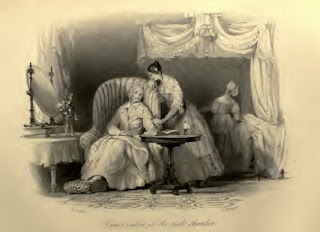Sarah Stickney Ellis (born 1799)
added greatly to the ‘improving’ literature of the Victorians – with a total of
thirty-four books, of poetry, fiction and social anthropology.
 |
| Sarah Stickney Ellis |
Sarah Stickney
had been a Quaker but converted to become a Congregationalist, and in 1837 she
married the widower William Ellis, the Chief Foreign Secretary of the London
Missionary Society. He was a prolific, and successful, writer and had
travelled, on behalf of the Society, with his first wife, Mary, to Hawaii.
After their return to England, Mary died in 1835; a mutual friend introduced
William to Sarah and after a short courtship they were married. She shared his
missionary zeal, his love of writing and both were keen members of the
Temperance movement. William died in 1872, after thirty-five years marriage and
Sarah died a mere seven days later.
 |
| William Ellis |
Her first work, The Negro Slave
(1830) was published anonymously and was an abolitionist novel ‘addressed to
the women of Great Britain’. She received acclaim for a later collection of
essays The Poetry of Life but made her name with The Women of England
(1839), which was followed by The Wives of England, The Daughters of England
and The Mothers of England.
 |
| Mrs Ellis - Family Secrets |
She also wrote a number of moralistic
novels, including The Minister’s Wife, Family Secrets and Temper and
Temperament. The theme of her works is consistent throughout – the role of
women in society. Her position was that women were inferior to men but they had
an innate ‘sixth sense’ that could be used for good, by exercising a moral restraint
on the excesses inherent in the natural male character. Wives, mothers and
daughters could improve their husbands, sons and brothers by ‘natural
kindness’, through support and maintaining the moral atmosphere of the home.
 |
| Female Influence |
Here she is on the relationship
between men and women.
In her intercourse with man, it is impossible but that woman should feel her own inferiority; and it is right that it should be so. (The Women of England)
Her concern is that women may
exceed their limits.
I am perfectly aware that there are intricate questions brought before our senate, which it may require a masculine order of intellect fully to understand. (The Daughters of England)
If you are going to talk, it would be best to engage the
brain prior to the mouth.
Do not suppose it would add any embellishment to your conversation, for you to discuss what are called politics, simply as such, especially when, as in nine cases out of ten, you do not really understand what you are talking about. (The Daughters of England)
 |
| Conversation in the Sick Chamber |
Or maybe, do not engage the mouth at all.
Most kindly, however, has it been accorded by man to his feeble sister, that it should not be necessary for her to talk much, even on his favourite topics, in order to obtain his favour. (The Daughters of England)
And what might it be that so
distracted the ladies of the nation?
One of the greatest drawbacks to the good influence of society is the almost unrivalled power of fashion upon the female mind. (The Daughters of England)
But things might well go too far
in the opposite direction.
The possession of genius is, to a woman, a birthright of very questionable value. It is a remark, not always charitably made, but unfortunately too true, that the most talented women are not the most agreeable in their domestic capacity. (The Women of England)
 |
| The Favourite Child |
Men, after all, don’t want to be
involved with a woman who can’t keep the place neat and tidy.
No power of intellect, or display of learning, can compensate to men, for the want of nicety or neatness in the women with whom they associate in domestic life. (The Women of England)
After all, marriage is the goal of any woman in her right
mind.
If there be one principle in woman's nature stronger than all others, it is that which prompts her to seek sympathy and protection from some being whom she may love, and by whom she may be loved in return. (The Wives of England)
The poor dears just can’t help
themselves. But remember –
Woman's love may grow after marriage - man's, never. If therefore, he is indifferent or unfaithful as a lover, what must be expected of him as a husband! (The Wives of England)
And don’t go making decisions
about where the family home is going to be.
He and his friends will be better judges than you can be of the general reasons for fixing your future residence. (The Wives of England)
It may be all the better if you
stick to small, furry creatures.
There is, however, a sickly sensibility indulged in by some young ladies, which I should be the last to recommend. Many, for instance, will nurse and fondle animals, without ever taking the trouble to feed them. (The Daughters of England)
 |
| It is too late |
But don’t give up, girls. Nature
has the matter in hand.
It is unquestionably an honourable distinction to be the chosen companion of an enlightened and good man; but we must not forget, that nature never yet formed any woman too destitute of attractions, or sent her forth into the world too meanly endowed, for her to be chosen as a wife. (The Wives of England)
Mrs Ellis puts me in mind of this
excellent skit by Mr Enfield and his chums.
No comments:
Post a Comment